The world of cryptocurrency is constantly evolving, with new innovations shaping the future of blockchain technology. Among the latest advancements are ORC-20 tokens, a new type of digital asset built on the ORC blockchain.
These tokens are designed to provide a more scalable, secure, and efficient alternative to existing token standards, offering new opportunities for developers and users alike. As the popularity of blockchain-based applications continues to grow, understanding ORC-20 tokens and their potential impact on markets is becoming increasingly important.
From decentralized finance (DeFi) to gaming, ORC-20 tokens are poised to change how digital assets are created, used, and traded. Their rise may also have implications for Bitcoin price changes, influencing the overall direction of blockchain technology.
ORC-20 Tokens Overview
ORC-20 tokens are a type of digital asset built on the ORC blockchain, a decentralized network designed to support fast, low-cost transactions and scalable applications. Similar to the popular ERC-20 token standard used on the Ethereum blockchain, ORC-20 tokens follow a specific set of rules and protocols that define their creation, transfer, and functionality.
However, ORC-20 tokens are tailored to work within the ORC blockchain ecosystem, which is designed to address some of the scalability and cost limitations of other blockchain networks. These tokens can represent various types of assets, from digital currencies to unique collectibles like NFTs, and can be used in decentralized applications (dApps) that run on the ORC blockchain.
Developers and businesses can issue ORC-20 tokens to create new blockchain-based products and services. With the growing adoption of blockchain technology, ORC-20 tokens are becoming a key part of the broader cryptocurrency landscape, providing a secure and efficient means of conducting transactions and engaging with decentralized ecosystems.
The ORC Blockchain: Key Features
The ORC blockchain is a decentralized, high-performance blockchain network designed to overcome some of the challenges faced by earlier blockchain technologies, such as scalability and transaction costs. One of the key features of the ORC blockchain is its ability to handle a large number of transactions per second (TPS), making it an ideal platform for applications that require fast and efficient processing.
With its low transaction fees, ORC allows users and developers to execute transactions and build applications without the financial burden typically associated with other blockchains. Also, the ORC blockchain uses advanced consensus mechanisms to ensure security and decentralization, providing a robust foundation for creating and managing digital assets like ORC-20 tokens.
The network also supports creating decentralized applications (dApps), enabling developers to build innovative products that operate on its blockchain. As the ORC blockchain continues to evolve, its features position it as a highly competitive platform in the rapidly expanding blockchain space.
How ORC-20 Tokens Compare to Other Token Standards
Compared to other token standards, such as Ethereum’s ERC-20 or Binance’s BEP-20, ORC-20 tokens stand out for their unique capabilities tailored to the ORC blockchain. While ERC-20 tokens have become the standard for many decentralized applications (dApps), they face challenges in scalability and transaction costs as blockchain networks become more congested.
ORC-20 tokens, on the other hand, benefit from the ORC blockchain’s high throughput, enabling faster and more affordable transactions. Unlike ERC-20, which is based on the Ethereum blockchain, ORC-20 tokens utilize a consensus mechanism designed for greater energy efficiency and speed.
Additionally, the ORC blockchain’s lower fees make ORC-20 tokens an attractive option for developers seeking to minimize operating costs while maintaining a robust and scalable network. For businesses looking to issue tokens for various use cases, ORC-20 provides a more cost-effective and efficient alternative compared to existing token standards.
Use Cases and Potential Applications
Thanks to the flexibility of the ORC blockchain, ORC-20 tokens have a wide range of potential applications across various sectors. One primary use is in the creation of decentralized finance (DeFi) products, including lending platforms, exchanges, and decentralized insurance services.
ORC-20 tokens can also represent non-fungible tokens (NFTs), which are gaining traction in digital art, gaming, and collectibles. Also, these tokens can be used to create loyalty programs, reward systems, and governance tokens within decentralized autonomous organizations (DAOs).
What’s more, ORC-20 tokens have the potential to streamline supply chain management by providing traceable, transparent data in real-time. Another promising use case is tokenizing real-world assets, such as real estate, enabling fractional ownership and easier transfer of property.
Unlocking the Future: The Promise of ORC-20 Tokens
ORC-20 tokens present a compelling advancement in the blockchain space, offering faster, more efficient, and lower-cost alternatives to traditional token standards like ERC-20. Their potential to enable scalable applications, reduce transaction fees, and support decentralized finance makes them an attractive option for developers, businesses, and investors. As blockchain technology continues to evolve, ORC-20 tokens are positioned to become a key player in the future of digital assets.


More Stories
Why Every Modern Workshop Needs an Industrial Laser Welder
Video Game Aeonscope: Dive into an Epic Adventure
AeonScope: Discover the Future of Web Solutions